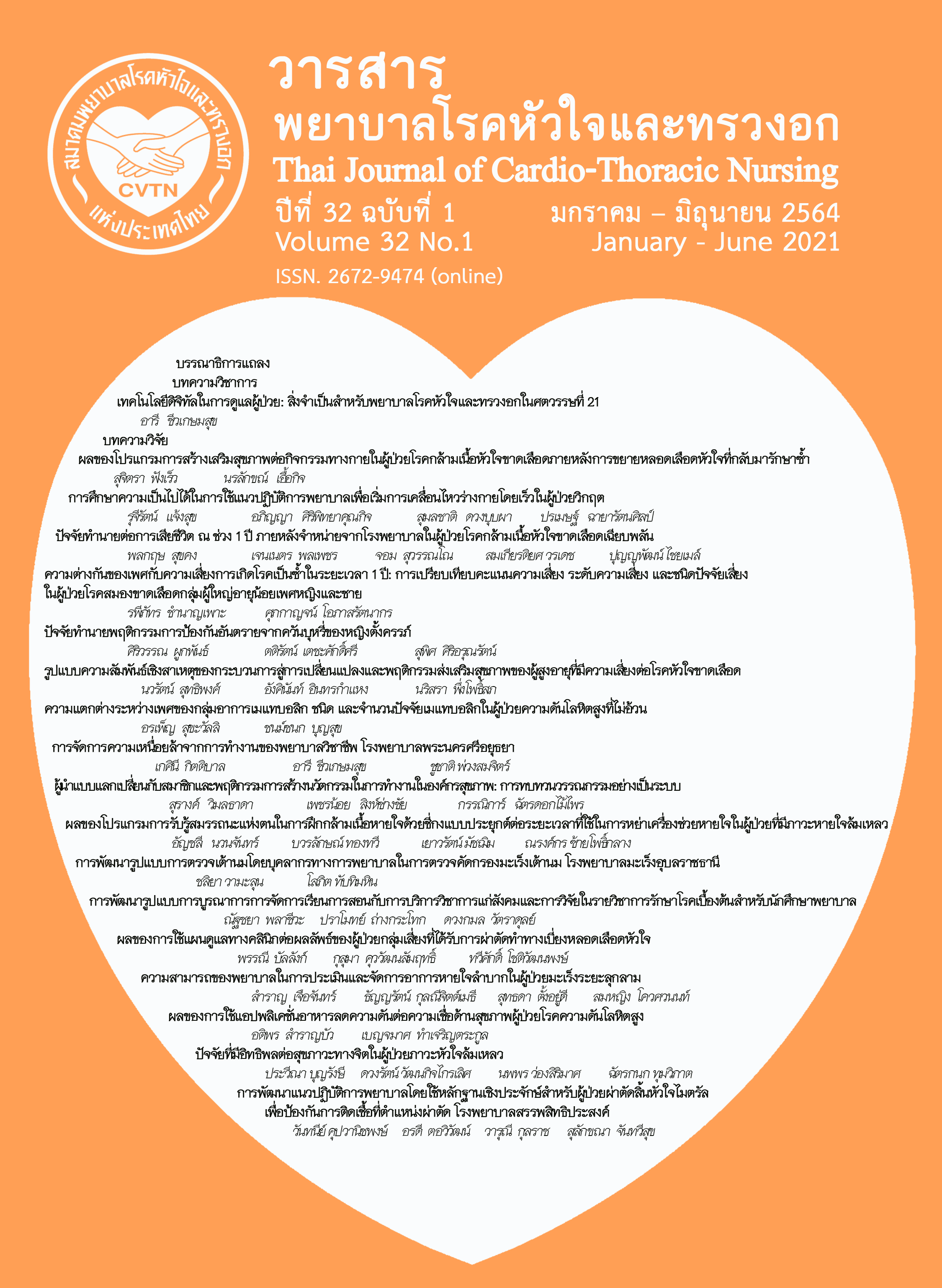Nurses’ ability to assess and manage dyspnea in advanced cancer patients
Keywords:
advanced cancer, dyspnea, nurses’ ability, symptom assessment, symptom managementAbstract
This descriptive research aimed to study nurses’ perceived ability to assess and manage dyspnea in advanced cancer patients and to compare nurses’ ability to assess and manage dyspnea according to their personal factors. The sample consisted of 85 professional nurses who cared for hospitalized cancer patients in Chulabhorn Hospital. Personal data record forms and nurses’ perceived ability to assess and manage symptom in advanced cancer patient questionnaires were used in data collection. Data were collected during August to September 2019 and were analysed using descriptive statistics, independent t-test / Mann-Whiney U test and One way ANOVA / Kruskal Wallis.
The results revealed that nurses perceived their knowledge, practice abilities and overall abilities to assess and manage dyspnea in advanced cancer patients at the moderate levels. Nurses who graduated master degree perceived their ability higher than those who graduated bachelor degree. However, training, experience caring for cancer patients, experience assessing and managing dyspnea, availability of an assessment tool and a clinical practice guideline for assessment and management dyspnea did not affect ability to assess and manage dyspnea in advanced cancer patients.
The study recommends the training courses for developing nurses’ ability in dyspnea assessment and management, and a practice guideline for assessment and management of dyspnea in advanced cancer patients.
References
American Cancer Society [Internet]. 2018 [cited 2020 Sep 5] Available from: https://www.cancer orgtreatment/understanding-your-diagnosis/ advanced-cancer/what-is.html
Meriggi F. Dyspnea in cancer patients. Rev Recent Clin Trials. 2018; 13:1-15.
Rungjang S, Namjuntra R. Symptom management in patient with advance lung cancer. Thai Journal of Cardio-Thoracic Nursing 2016; 27:43-57. (in Thai).
Seow H, Babera L, Sutradhar R, Howell D, Dudgeon D, Atzema C, et al. Trajectory of performance status and symptom scores for patients with cancer during the last six months of life. J Clin Oncol. 2011;Mar 20.[PubMed]
Damani A, Ghoshal A, Salins N, Deodhar J, Muckaden M. Prevalence and intensity of dyspnea in advanced cancer and its impact on quality of life. Indian J Palliat care. 2018; 24:44–50.
National Comprehensive Cancer Network [Internet].2017 [cited 2020 Sep 5] Available from: https://www.nccn.org/professionals /physician_gls/pdf/palliative
Oncology Nursing Society [Internet].2016 [cited 2020 Sep 5] Available from: https://www.ons. org/sites/default/files/Oncology
British Columbia Cancer Agency [Internet]. 2018 [cited 2020 Sep 10] Available from: http://www.bccancer.bc.ca/health-professionals/ clinical resources/nursing/ symptom-management
Cancer Care Ontario. [Internet]. 2010[cited 2020 Sep 10] Available from: https://www.cancer care ontario.ca/en/symptom-management
Bouya S, Balouchi A, Maleknejad A, Koochakzai M, AlKhasawneh E, Abdollahimohammad A. Cancer pain management among oncology nurses: knowledge, attitude, related factors, and clinical recommendations: a systematic review. J Cancer Educ. 2019; 34:839-46.
Pai RR, Ongole R. Nurses’ Knowledge and education about oral care of cancer patients undergoing chemotherapy and radiation therapy. Indian J Palliat care. 2015; 21:225-30.
Pearson EJM, Morris ME, McKinstry CE. Cancer-related fatigue: a survey of health practitioner knowledge and practice. Support Care Cancer. 2015; 23:3521-9.
Qadire MA, Alkhalaileh M. Jordanian oncology nurses' knowledge of managing chemotherapy-induced nausea and vomiting. Br J Nurs. 2018; 27:S4-12.
Shehab MS, Abd-Elkader H, Ibrahim NM. Assessment of nurses’ practice related to managing patients with dyspnea at emergency units at Port Said Hospitals. Int J Caring Sci. 2016; 9:1066-74.
Juejan S, Namjuntra R, Namvongprom A. Nurses’ ability to assess and manage symptoms of patients with advanced cancer. The Journal of Faculty of Nursing Burapha University. 2021; 29(1):25-36. (in Thai)
Omran S, Qadire AM, Ali AN, Hayek AFM. Knowledge and attitudes about pain management: a comparison of oncology and non-oncology. Jordanian nurse. Nursing and Health. 2014; 2:73-80.
Salim N. A, Faisal W. A, Hussain H. Nurses approach toward cancer pain management in oncology unit of Dubai Hospital, Dubai Health Authority in 2017. J Nurs Patient Care. 2018; 3:57. doi: 10.4172/2573-4571-C6-030
So WKW, Chan DNS, Chan HYL, Krishnasamy M, Chan T, Ling WM, et al. Knowledge and practice among Hong Kong oncology nurses in the management of chemotherapy-induced nausea and vomiting. Eur J Oncol Nurs. 2013; 17:370-4. doi: 10.1016/j.ejon.2012.10.001.
Tranmer R, Boyd L, Johnson T, Howlett, B, Bowen D, Peterson T. National survey of oncology members’ knowledge, education, and patient management regarding oral care in cancer therapy. HIPE 2013; 2:eP1049. doi: 10.7772/2159-1253-1049
Hou SY, Lee RP. Nurses' knowledge, attitudes and behavior intentions in the care of terminal stage cancer patients with dyspnea. Hu li Za Zhi. 2009; 56: 46-56.
Bloom BS, Hasting JT, Madaus GF. Handbook on formative and summative evaluation of student learning. New York: McGraw-Hill Book Co; 1971.
Downloads
Published
How to Cite
Issue
Section
License
บทความนี้ยังไม่เคยตีพิมพ์หรืออยู่ในระหว่างส่งไปตีพิมพ์ในวารสารอื่น ๆ มาก่อน และกองบรรณาธิการขอสงวนสิทธิ์ในการตรวจทาน และแก้ไขต้นฉบับตามเกณฑ์ของวารสาร ในกรณีที่เรื่องของท่านได้ได้รับการตีพิมพ์ในวารสารฉบับนี้ถือว่าเป็น ลิขสิทธิ์ของวารสารพยาบาลโรคหัวใจและทรวงอก






